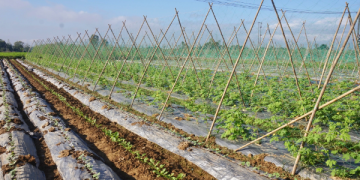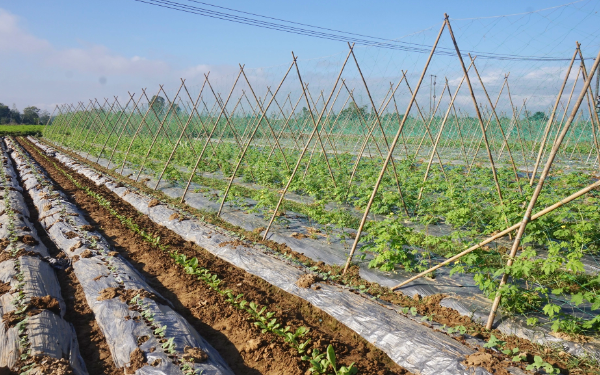#TetSeason #VegetableCultivation #QuangNamFarmers #SustainableAgriculture #VietnameseFarming #BauTronVillage #CropDiversification #AgriculturalInnovation #CleanFarming #HarvestPreparation
The fertile fields of Bau Tron village, nestled in the heart of Quang Nam province, are gearing up for an abundant Tet season. With a total area of 20 hectares, more than 200 households specialize in cultivating short-term leafy vegetables such as lettuce, kale, cucumbers, bitter melon, and more, catering to both local and provincial markets.
Amidst favorable weather conditions, farmers in the region are diligently preparing the soil, sowing seeds in vacant plots to ensure a successful vegetable harvest for Tet, the Vietnamese New Year. Nguyen Van Tien, a farmer focusing on bitter melon and sponge gourd cultivation, expresses optimism about this year’s weather conditions, anticipating a healthy and disease-resistant crop. With over 8 acres of land, Tien strategically sows various crops, including sponge gourd, cucumber, bitter melon, and more – all popular choices during the Tet season, fetching prices ranging from 15,000 to 30,000 VND per kilogram.
To avoid oversupply and price fluctuations during Tet, farmers adopt a staggered sowing approach, ensuring harvests before, during, and after the festive season. Nguyen Quang Huong, cultivating cucumber, sponge gourd, and bitter melon on his 7-acre plot, estimates a profit of over 20 million VND during Tet if weather conditions remain favorable.
Despite rising costs for seeds, fertilizers, and other inputs, farmers like Huong remain dedicated to their craft. While prices for Tet vegetables might not significantly surpass regular rates, the increased quantity compensates, with vegetables often selling three to four times more than usual.
Nguyen Van Tien, aged 63, carefully observes his bitter melon fields, emphasizing the importance of early planting to cater to the Tet market. The high-altitude location of his land prompts early sowing, ensuring a diverse range of vegetables for market demand.
Learning from previous years, farmers in Bau Tron village avoid mass sowing, opting for phased planting to prevent oversupply and subsequent price drops. This strategic approach enables them to manage the market more effectively, ensuring stable prices and reduced risks.
Diversification is also a key strategy, with some farmers practicing intercropping of short-term crops like peanuts, kale, chili, and corn. This not only minimizes market risks but also stabilizes prices.
In adherence to sustainable farming practices, farmers in Bau Tron prioritize clean and organic cultivation, minimizing the use of pesticides in favor of bio-friendly alternatives. This commitment has made their produce desirable to traders, leading to stable prices and widespread distribution in markets including Da Nang and other provinces.
The farmers of Bau Tron, Quang Nam, embody resilience and dedication in the face of challenges. Their meticulous planning, adherence to sustainable practices, and strategic cultivation methods not only promise a prosperous Tet season but also contribute to the overall sustainability of the region’s agricultural sector.































